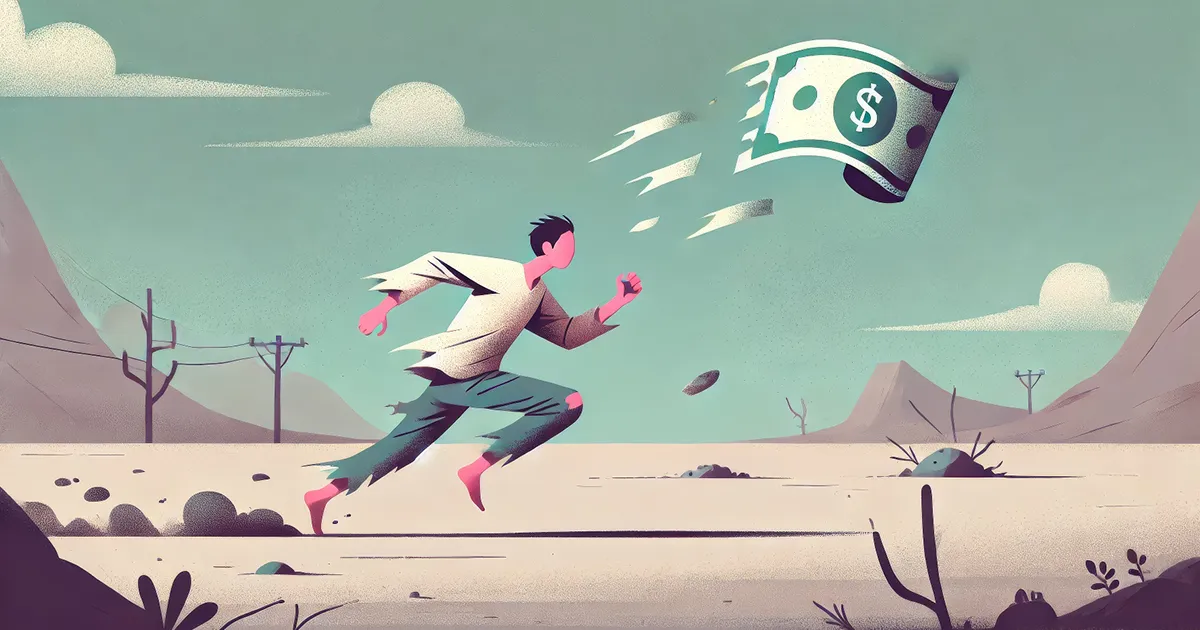
Do you ever wonder why, no matter how hard you work or how much you save, wealth always seems just out of reach? Maybe you’ve convinced yourself that it’s the economy, bad luck, or a series of unfortunate events holding you back. But what if the real culprit is something much closer to home? What if the very habits and choices you make every day are actively ensuring that you’ll never get rich?
The truth is, most people unknowingly sabotage their own financial success. They follow advice that seems sound, avoid risks out of fear, and surround themselves with like-minded individuals who reinforce the same toxic behaviors. And the scariest part? You’re probably doing it too—right now.
In this article, we’re going to break down the wealth-killing habits that guarantee you’ll stay financially stuck. These are the silent wealth-killers—things you’ve likely justified or rationalized over the years, not realizing how much they’re costing you in the long run. By the end, you’ll not only recognize these habits in yourself, but you’ll also have the tools to reverse them and finally start building the financial future you deserve.
So, are you ready to face the uncomfortable truth? Let’s dive in.
Introduction: The Hidden Habits Holding You Back
Habit 1: Prioritizing Comfort Over Growth
Habit 2: The "I’ll Save Later" Trap
Habit 3: Fear of Taking Risks (And How It’s Costing You)
Habit 4: Surrounding Yourself with Like-Minded (Broke) People
Habit 5: Relying on a Single Source of Income
Habit 6: Overvaluing Short-Term Pleasure Over Long-Term Wealth
Habit 7: Failing to Invest in Yourself
Habit 8: Not Understanding How Money Works
Habit 9: Believing That Hard Work Alone Will Make You Rich
We all have dreams of financial freedom—envisioning a life where money is no longer a source of stress, but a tool for opportunity. Yet, for most, that dream remains just that—a distant, almost unreachable fantasy. The truth is, it’s not always the big, dramatic mistakes that keep you from building wealth. More often than not, it’s the subtle, everyday habits you’ve adopted without a second thought. They feel familiar, even logical, but they’re quietly eroding your chances of ever getting rich.
You might think you’re playing it safe, being responsible, or avoiding unnecessary risks. But what if those same “safe” decisions are exactly what’s keeping you stuck in the cycle of financial mediocrity? The reality is, many people spend years working hard, all the while unknowingly sabotaging their own success. And the worst part? These habits don’t always seem harmful—until it’s too late.
In the following sections, we’re going to pull back the curtain on the 10 foolproof strategies that guarantee you’ll never get rich. These aren’t complicated financial mistakes or obscure investment blunders. No, these are the everyday choices that millions of people make without realizing the long-term damage they’re causing. And chances are, you’re probably doing a few of them right now.
Ready for a wake-up call? Let’s start by exposing the first one: the dangerous lure of comfort.
Comfort is seductive. It whispers promises of security and stability, making you believe that as long as you’re comfortable, you’re doing alright. But comfort is also a trap—a cozy cage that keeps you from reaching your full financial potential. When you prioritize comfort, you avoid the unknown, shy away from challenges, and settle for “good enough” rather than striving for greatness.
Maybe you’ve stayed in the same job for years, not because it’s fulfilling or offers great opportunities for growth, but because it’s predictable. You know what to expect, you’re good at it, and the paycheck comes regularly. The problem is, that same predictability is limiting your ability to grow, learn new skills, and increase your earning potential. It keeps you locked in a financial plateau.
True wealth doesn’t come from playing it safe; it comes from embracing discomfort, taking calculated risks, and stepping into spaces that push you beyond what’s familiar. If you want to break the cycle, you have to be willing to sacrifice short-term comfort for long-term growth. This doesn’t mean quitting your job tomorrow, but it does mean actively seeking out ways to challenge yourself—whether that’s learning new skills, pursuing side hustles, or taking on projects that force you to grow.
Remember: comfort feels nice in the moment, but nothing great ever comes from staying where it’s easy.
If there’s one phrase that ensures financial stagnation, it’s “I’ll start saving later.” Living paycheck to paycheck is one of the most common habits that keep people from accumulating wealth. The mindset behind it is simple: as long as you’re covering your bills and surviving each month, there’s no rush to save or invest. You’ll start “when things settle down,” or “once you get that raise,” or “after you’ve paid off this debt.” But guess what? Later rarely comes.
When you put off saving, you’re not just delaying wealth-building; you’re missing out on the power of compound growth—the magic that turns small, early investments into massive financial gains over time. Every month you choose to spend instead of save, you’re giving up future opportunities for financial security.
The reality is, if you wait until it’s convenient to start saving, you’ll never do it. There will always be another expense, another reason to put it off. The key to breaking the paycheck-to-paycheck cycle isn’t earning more; it’s being intentional with what you already have. Prioritize saving—even if it’s a small amount—and make it automatic. Once you build the habit, you’ll be amazed at how quickly your financial picture can change.
There’s a reason so many people stay financially stuck—they’re scared of taking risks. But here’s the thing: all wealth-building involves some level of risk. Whether it’s investing in the stock market, starting a business, or switching careers, every path to financial growth comes with uncertainty. The problem isn’t risk itself; it’s your fear of it.
Too many people choose to play it safe, believing that if they avoid risk, they’ll avoid failure. But the reality is, by avoiding risk, they’re also avoiding any chance at significant financial gain. No one ever got rich by stashing their money in a savings account or sticking to the status quo. If you want to build wealth, you need to embrace risk—not recklessly, but intelligently.
This doesn’t mean jumping into high-risk investments without thinking. It means doing your research, educating yourself, and taking calculated risks that have the potential for high rewards. It’s about getting out of your comfort zone and recognizing that, yes, there’s always a chance of failure—but there’s also a chance for success that far outweighs the cost of staying where you are.
Without risk, there is no reward. The trick is learning how to manage that risk, not avoid it entirely.
Ever heard the saying, “You are the average of the five people you spend the most time with?” It’s more than just a motivational quote—it’s a hard truth when it comes to wealth. Your social circle has a huge influence on your financial habits and mindset. If you’re constantly around people who are stuck in the same paycheck-to-paycheck cycle, making the same financial mistakes, and reinforcing negative beliefs about money, you’re going to find it nearly impossible to break free.
It’s not that your friends and family are bad people—they’re just trapped in the same system as you. But if you want to grow, you need to surround yourself with people who push you to think bigger, aim higher, and make smarter financial decisions. This doesn’t mean cutting ties with everyone you know, but it does mean being intentional about who you listen to and learn from.
Seek out mentors, friends, or communities that challenge your financial assumptions. Find people who have the kind of wealth or success you aspire to and learn from them. Their mindset, habits, and knowledge will start to rub off on you, helping you break out of the cycle of mediocrity. Remember, growth is contagious, but so is stagnation. Choose your influences wisely.
In today’s economy, relying on one source of income is like walking a financial tightrope without a safety net. It might feel stable now, but what happens if that paycheck disappears? Whether it’s due to job loss, illness, or unexpected circumstances, depending on a single stream of income is a recipe for financial disaster.
Wealthy people understand the importance of diversifying their income streams. They don’t just rely on a 9-to-5 job—they invest in stocks, start businesses, own real estate, and build passive income streams that keep money flowing in from multiple directions. This creates financial resilience and, more importantly, gives them the freedom to take risks and pursue opportunities without the constant fear of losing everything.
If you’re serious about building wealth, you need to start thinking beyond your paycheck. Look for ways to create additional streams of income, whether through side hustles, investments, or leveraging your skills in new ways. The more sources of income you have, the more financial freedom and security you’ll build for the future.
In a world of instant gratification, it’s easy to fall into the trap of prioritizing short-term pleasures over long-term financial security. Whether it’s splurging on the latest tech gadget, dining out frequently, or indulging in impulsive shopping sprees, these small luxuries provide fleeting satisfaction but do little for your financial future. The problem isn’t necessarily the occasional treat—it’s the habit of consistently choosing immediate desires over future gains.
When you spend without thinking about the long-term impact, you’re robbing your future self of wealth-building opportunities. Every dollar spent on temporary pleasure is a dollar that could have been invested, saved, or used to grow your wealth. The wealthy understand the value of delayed gratification. They recognize that by sacrificing today’s pleasures, they’re setting themselves up for a future where those pleasures can be enjoyed without financial stress.
To break this cycle, start by being more mindful of your spending. Before making a purchase, ask yourself: “Is this something I truly need, or am I just looking for a quick fix of happiness?” Then, consider how that money could be working for you if invested. Over time, you’ll start to shift your focus from instant gratification to long-term wealth creation. Remember, wealth is built over time, not overnight, and it often requires making uncomfortable choices today for a more comfortable tomorrow.
Your greatest asset is you. Yet, many people fail to invest in themselves, and in doing so, they limit their potential for financial growth. Whether it’s neglecting to learn new skills, avoiding self-improvement, or simply not taking the time to expand your knowledge base, failing to invest in yourself is one of the biggest mistakes you can make on the road to wealth.
Personal growth and education are the foundations of financial success. The more you know and the more skills you acquire, the more opportunities you create for yourself. Whether that’s earning a promotion, starting a business, or mastering an investment strategy, self-investment opens doors that would otherwise remain closed. But too often, people become complacent, relying on what they already know rather than pushing themselves to grow.
To change this, start thinking of personal development as a non-negotiable investment. This could mean reading books on finance, taking courses to improve your skills, networking with people who can teach you new things, or even investing in your health and well-being. The more you invest in yourself, the more value you bring to the table—and the higher your potential for earning and growing wealth.
Financial literacy is the foundation of wealth-building, yet many people lack even a basic understanding of how money works. It’s not enough to simply earn money—you need to know how to manage, invest, and grow it. Unfortunately, most people are never taught the fundamental principles of money management, leaving them to make costly mistakes that hinder their ability to build wealth.
Whether it’s racking up high-interest debt, failing to understand the power of compound interest, or simply not knowing how to budget, financial ignorance can keep you stuck in a cycle of frustration and financial stress. The wealthy, on the other hand, make it a priority to understand how money works. They know how to make their money work for them, through smart investing, budgeting, and understanding the value of time in relation to wealth-building.
If you’re serious about breaking the cycle, it’s time to educate yourself. Start with the basics: learn about budgeting, saving, investing, and debt management. There are countless resources available, from books to online courses, that can teach you how to manage your finances effectively. The more you know, the better equipped you’ll be to make informed decisions that move you closer to your financial goals.
There’s a widespread myth that if you just work hard enough, success and wealth will naturally follow. While hard work is certainly important, it’s not the only factor that determines financial success. In fact, many people work incredibly hard their entire lives and still struggle to make ends meet. That’s because hard work alone doesn’t guarantee wealth—you also need strategy, leverage, and the ability to make smart financial decisions.
The truth is, working harder often leads to burnout rather than financial freedom. The wealthy don’t just work hard—they work smart. They understand the importance of leveraging other people’s time, money, and resources to create value and grow their wealth. They focus on building systems that generate income, rather than relying solely on their own labor.
If you want to break out of the cycle, it’s time to shift your mindset. Instead of just focusing on working harder, start thinking about how you can work smarter. How can you use your time more efficiently? How can you create passive income streams? How can you make your money work for you, rather than the other way around? By combining hard work with smart strategies, you’ll be much closer to achieving financial success.
Passive income is one of the most powerful tools for building wealth, yet many people ignore it, focusing only on their active income from a 9-to-5 job. The problem with relying solely on active income is that it’s limited—you can only work so many hours in a day. Passive income, on the other hand, allows you to earn money even when you’re not actively working. It’s the key to financial freedom.
There are countless ways to generate passive income, from investing in stocks and real estate to creating digital products or starting a side business that runs with minimal oversight. The goal is to create systems that generate income without requiring your constant attention. This doesn’t mean passive income is easy—it often requires time, effort, and investment upfront—but once those systems are in place, they can continue to pay off for years to come.
If you want to achieve long-term financial security, it’s crucial to start building passive income streams. Don’t wait for the “perfect” time or opportunity—start now, even if it’s small. Whether it’s putting money into a dividend-paying stock, renting out property, or creating an online course, every step you take toward generating passive income moves you closer to financial independence.
By now, you’ve probably recognized a few of these habits in yourself. Maybe you’ve been prioritizing comfort, living paycheck to paycheck, or avoiding risks. The good news is, it’s never too late to change. The first step is recognizing where you’ve been going wrong and committing to doing things differently moving forward.
Breaking these habits won’t happen overnight, but with consistent effort, you can start to build the financial future you’ve always wanted. Start small—whether it’s setting aside money for savings, taking a course to invest in yourself, or creating a plan for generating passive income. The key is to take action. By doing so, you’ll begin to shift from a mindset that keeps you stuck to one that propels you toward wealth and financial freedom.
So, are you ready to break free from the habits that have been holding you back? The choice is yours. Take the first step today, and you’ll be one step closer to achieving the financial success you deserve.
Share with like-minded people!
Lorem Ipsum is simply dumy text of the printing typesetting industry lorem.

Money can buy comfort, but not meaning. Explore why lasting happiness depends on more than wealth, and how to live a life where money supports—not controls—you.

Discover the everyday money habits that self-made millionaires swear by. These practical strategies can help anyone grow wealth—no matter their income level.

Discover the truth about passive income myths and avoid common traps. This article debunks misconceptions and provides practical, realistic strategies to help you build sustainable passive income.

Learn how emotions influence your spending habits and discover practical strategies to break free from emotional spending. Take control of your finances and make mindful choices that benefit your future.

Explore why people continue to fall for money scams despite warnings. Learn the psychology behind scams, recognize red flags, and find actionable steps to protect your financial future.